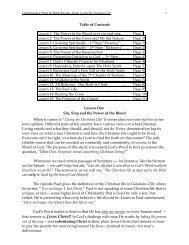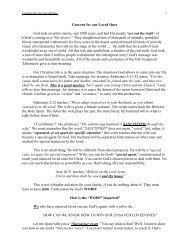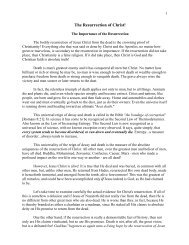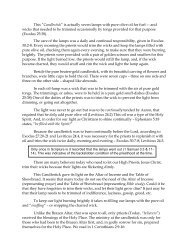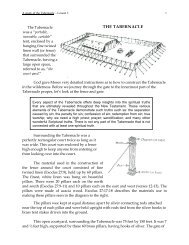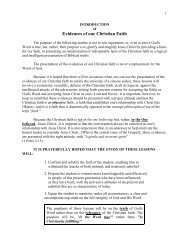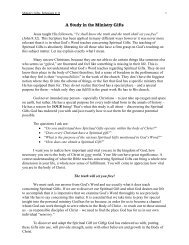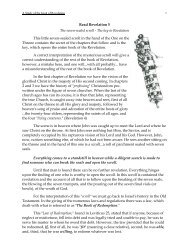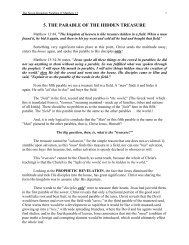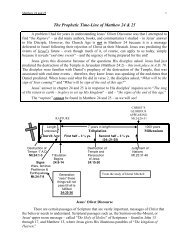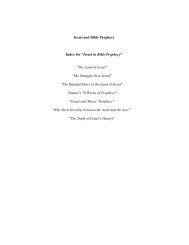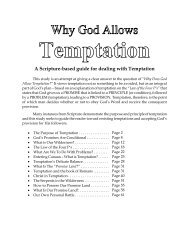ALLEGED BIBLE CONTRADICTIONS - NetBibleStudy.com
ALLEGED BIBLE CONTRADICTIONS - NetBibleStudy.com
ALLEGED BIBLE CONTRADICTIONS - NetBibleStudy.com
You also want an ePaper? Increase the reach of your titles
YUMPU automatically turns print PDFs into web optimized ePapers that Google loves.
5<br />
Another Scriptural passage which has been misunderstood because of a lack<br />
of understanding of the peculiarities of the Hebrew language is Exodus 9:12, which<br />
states, "The Lord hardened the heart of Pharaoh." Before one can under- stand what<br />
this passage is really saying, he need to have knowledge of the fact that, in the<br />
Hebrew culture, whenever someone, in any way, permitted something . . . permitted<br />
any action to take place . . . it was said that he was responsible for that thing having<br />
been done. Since this was the Hebrew culture's way of expressing itself, what Exodus<br />
9:12 is really saying, is that God simply permitted Pharaoh's heart to be hardened.<br />
The Biblical context will show that it was Pharaoh's own choice, his constant choice<br />
of resisting God every time that God gave him the occasion to do so, that caused him<br />
to harden his own heart.<br />
In the same way, the presentation of the Gospel affords one the opportunity to<br />
either harden, or soften, his heart, to its message. If he accepts, and "receives,"<br />
the Gospel message, his heart is softened and he is, consequently, saved and<br />
made alive. On the other hand, if he rejects, and resists, the Gospel message, his<br />
heart is hardened and he is consequently, damned, and "lost."<br />
[See Romans 2:4-11 and 2 Corinthians 2:15-16]<br />
Just as the sun either hardens clay, or softens wax, God's truths, His actions, either<br />
break the self-nature, subdue the self-life of an individual, or they, ultimately, only serve<br />
to harden his heart, and, just as the "determining factor" of whether the sun will either<br />
cause a material to harden or soften, lies in the material itself, and not in the sun. So, too,<br />
the "determining factor" of whether or not God's truths, or actions, "causes" an<br />
individual's heart to harden of soften, lies in the individual himself, rather than in God.<br />
Whenever anyone studies a language, [such as French, German, Greek, Latin, or<br />
any language], he learns that there are some words in one language that does not have<br />
any exact equivalent in other languages. This, of course, means that there is no such thing<br />
as a "word-for-word" translation from one language to another. Therefore, a word-forword<br />
translation is impossible, not only because of the lack of word-equivalents between<br />
languages, but, also, because words, in every language, carry cultural connotations<br />
which, apart from the narrative discourse ac<strong>com</strong>panying the text, cannot be translated<br />
with any degree of absolute accuracy! Add to all this, the fact that individual words can<br />
have numerous meanings.<br />
For example, the English word "fast," when used as an adjective, has different<br />
meanings, depending on the word it is defining; a "fast" shut door is a door that is<br />
closed tightly; a "fast" friend is a person who is especially close to someone; a "fast"<br />
plane is one that travels at a high speed; a "fast" dye is a dye that doesn't fade, etc,<br />
etc.<br />
In the same way, we are told that the English word "run" has at least ninety-two<br />
[that's 92!] meanings in the English language!<br />
It is also true that, like English words, Greek words can have a number of different<br />
meanings: For example the Greek word "katergadzomai" can mean "to achieve," "to create," "to<br />
prepare," or "to overpower," which means that each time a translator is faced with translating



